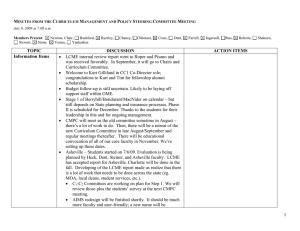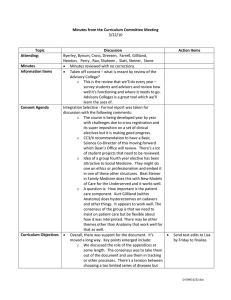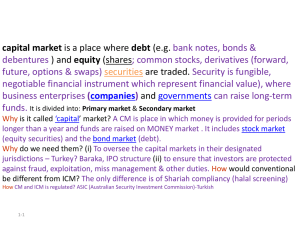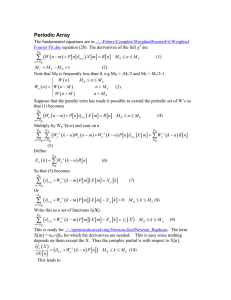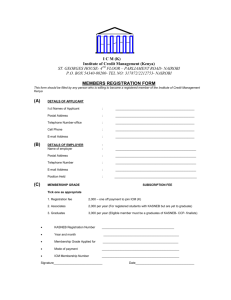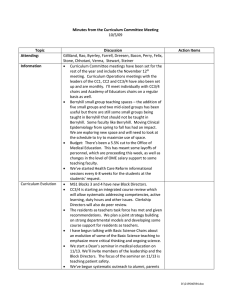1/25/10 Cairns, Fields, Perry, Chhotani, Verma
advertisement
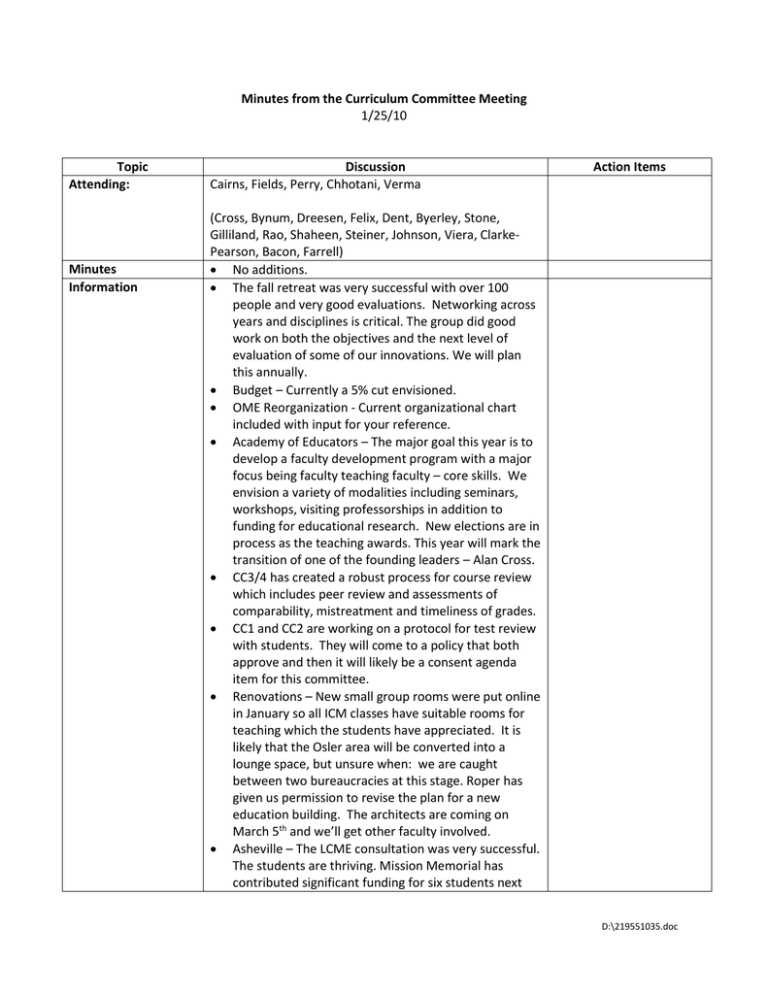
Minutes from the Curriculum Committee Meeting 1/25/10 Topic Attending: Minutes Information Discussion Cairns, Fields, Perry, Chhotani, Verma Action Items (Cross, Bynum, Dreesen, Felix, Dent, Byerley, Stone, Gilliland, Rao, Shaheen, Steiner, Johnson, Viera, ClarkePearson, Bacon, Farrell) No additions. The fall retreat was very successful with over 100 people and very good evaluations. Networking across years and disciplines is critical. The group did good work on both the objectives and the next level of evaluation of some of our innovations. We will plan this annually. Budget – Currently a 5% cut envisioned. OME Reorganization - Current organizational chart included with input for your reference. Academy of Educators – The major goal this year is to develop a faculty development program with a major focus being faculty teaching faculty – core skills. We envision a variety of modalities including seminars, workshops, visiting professorships in addition to funding for educational research. New elections are in process as the teaching awards. This year will mark the transition of one of the founding leaders – Alan Cross. CC3/4 has created a robust process for course review which includes peer review and assessments of comparability, mistreatment and timeliness of grades. CC1 and CC2 are working on a protocol for test review with students. They will come to a policy that both approve and then it will likely be a consent agenda item for this committee. Renovations – New small group rooms were put online in January so all ICM classes have suitable rooms for teaching which the students have appreciated. It is likely that the Osler area will be converted into a lounge space, but unsure when: we are caught between two bureaucracies at this stage. Roper has given us permission to revise the plan for a new education building. The architects are coming on March 5th and we’ll get other faculty involved. Asheville – The LCME consultation was very successful. The students are thriving. Mission Memorial has contributed significant funding for six students next D:\219551035.doc Consent Agenda LCME Planning Process year. We’ve finalized the fourth year curriculum along the lines that we’ve previously discussed – two AI’s, two rural requirements with the APS or IS selective being built into the international experience. Several clerkship directors went on the site visit--Chuang, Lindsey and Klipstein—and will be meeting to talk about where this should go in the rest of the curriculum and will report back to this committee. The Charlotte site visit is now scheduled for May 12th/13th. We will move to identify campus Deans. The exact title depends on our discussions with the campus vis-à-vis the Bain report. We are also moving to complete memoranda of agreement and will attempt to get the AHEC housing fee increased. The Curriculum Director Search is in process. We have a number of candidates; Cam Enarson will also be joining the university with a significant track to help with the LCME process. He’ll also be working in Anesthesiology and other settings. WebCIS, CPOE & Beepers – We are defining a list of exactly what we need to do with Liz Dreesen and Christopher Klipstein and will push this as part of the LCME preparation. All approved. Note that there were two documents attached. The first is the overall LCME plan which has been approved by Bill and Etta and will be introduced to UNC SOM and UNCHCS leadership on 2/8. The second is a tracking document to follow-up which Lisa Slatt will use for remediation of all 44 issues. Comments and questions included: How will student self study be organized? There are a number of different models nationally. Cam, Georgette and I will work with Whitehead this spring to develop a process. I’ve announced it at town meetings. How will residents as teachers be organized? Preliminary work in included. Meetings with the Chairs and identification of some best practices for training residents as well as some sharing of resources. We need, however, an institutional strategy. I’ve begun the process of working with Phil Boysen and Brian Goldstein. The requirement is not only to offer but to assure that residents as teachers are trained as D:\219551035.doc School Objectives teachers. Our activities such as service and research are built into the school. These are a key part of the vibrancy of our school and will be built into the self study. What are the responsibilities to campuses? What about IT support? The Asheville pilot has taught us the need to revamp our student services and other activities. IT is one of this but access to advisors, financial counseling and the like are also important. We’ll need to come up with solutions on a campus by campus basis. Historically, we got involved in the satellite campus business (e.g., AHEC) 30 years before the current fashionability. These are resources we need to bring to bear for the students who are spending time there. This is particularly true if they spend all of their time there such as at Asheville and Charlotte. How will we do faculty appointments? We need to identify a list of faculty in both ICM and the clinical clerkships who are teaching. The LCME standard is clear that we need everybody who’s teaching medical students to have a faculty appointment. We need to develop a simplified process and we will act on that. The current draft was distributed with the minutes. Of note, we’ve had extensive input from this committee initially, the faculty as a whole at the retreat and then this committee again. The document has gone from approximately 25 pages single spaced to a 6 page core including appendices. The latest revision we were boiling down. We combined some of the specifics and reframed the objectives in sharper language that includes competencies. As a result of feedback, we have moved the ACGME communications element into the patient care component and a little bit into professionalism. We established a new competency around managing the health of populations. Newton/Stone will follow-up to push a simplified process for adjunct professors. Since this is within the School of Medicine, we will work with Harvey Lineberry and appropriate committees to develop this process. In the meantime, courses should develop lists of people who are teaching so we can target our efforts. There was consensus that it is much improved over initial document and retains its usefulness with shortening. Committee members will send limited conceptual edits to Newton. In a parallel process, Newton will send to the CC Directors who D:\219551035.doc Suggestions for additions/changes included: CPX Follow-up Include social and behavioral in the medical knowledge piece; Include the knowledge necessary for diagnosis and treatment in the medical knowledge piece. The acute care of the common conditions need to be framed as time dependent conditions and not have cardiac seizures. The Appendices A, B, C and D will need to be reframed and prioritized, probably converted into some sort of tracking mechanism that we will use to follow-up. It will be valuable to explore via AAMC whether there is any standard list of conditions or cases that other schools have worked on. NB: While it’s good to include, we’ve put a lot of effort into building up this current list of conditions from the bottom up. Professionalism – There are a number of elements that are not in there such as reliability, showing up on time, doing work and so on. Also, how these things will be assured. More broadly, in terms of process, how will this kind of document be used? We envision a longitudinal process in which students are told at the beginning what the objectives are and then every course they will be told which core competencies this course deals with. The core competencies has also become how faculty are oriented to education and how residents as teachers are told what they are teaching. We will develop a grid and review it regularly. We also discussed process of next steps. Newton and Slatt will make some minor revisions and then will send to CC committees for final input but the emphasis of that is beginning the process of tracking where things are in the curriculum. Please note that these are draft minutes and that there is a typo. It’s not the NC Clinical Skills program but the USMLE Clinical Skills program. There was a brief description of the background of the CPX and broad consensus that we needed to move forward with implementing the recommendations of the task force. We will need to develop a longitudinal curriculum and make sure the CPX plays a role in this. We will begin to do this. Comments included: will distribute to all course directors. Our goal now is to begin to map in the curriculum what is being taught where and with some additional edits and finalization in our March meeting. The committee endorsed the recommendations of the task force, underscoring the importance of the longitudinal curriculum in developing clinical skills and underscoring the role. D:\219551035.doc ICM Recommendations Report Format similar to the USMLE test is important. Integrating what is asked in the OSCE with what the clerkships are asking is important. This will need to be integrated development of CPX and OSCEs in clerkships. Students taking it seriously and believing that it’s relevant is a key element. The performance results this year are important. We also believe that if they are given a list of cases that they need to know that it is considered practice for the clinical skills test but harder. Please note that the document is a draft document and there is still discussion with the committee about various aspects of it. We had a preliminary discussion of ICM and its associated courses. The general sense was that the comments were well taken. There should be an overall longitudinal curriculum in clinical skills. ICM needs to feed into that. We need to have some discussion as to what things are being done too early. Where do the community weeks go? Do we eliminate or begin to repurpose to other pieces? The discussion was focused on two issues. First of all, was the committee supportive of major changes in ICM? The consensus was, “yes”. Appeals Policy What should be the core curriculum of ICM? Clinical skills +/- professionalism +/- clinical medicine. There was consensus that clinical skills needs to be at the heart of it and some variation as to whether there should be some element of that. There was support for significant changes in pedagogy including driving down experience to a smaller level. Committee members reviewed the specific issue of the appeals policy. The proposed goal is to simplify the process and take the committee of faculty out. The simplified process involves three levels of appeal unless there is an adverse decision that could result in expulsion. In which case, there would be an additional level of appeal to the Dean. With respect to process for amendment of policies, the committee got copies of the current process. Newton proposed we reform to allow this committee to advise on issues that relate to educational policy and not operationalization. Thus, the Curriculum Newton will follow-up with the task force and has made an appointment to meet with the students. He will move forward with the planning of a “major change” in ICM. This will depend on clinical skills, CPX and others. Given the size of the course, it will be a major change in the curriculum. The committee will review plans at the next session. The committee approved change of the appeal plan as noted. The committee endorsed the change in agenda and the committee will focus on obtaining faculty D:\219551035.doc Committee would deal with changes in policy with respect to admissions, promotions, curriculum and assessment of outcomes but not such as issues as the operationalization of appeals. input on core issues related to the educational program but allow the Dean’s Office to resolve administrative issues directly. D:\219551035.doc
